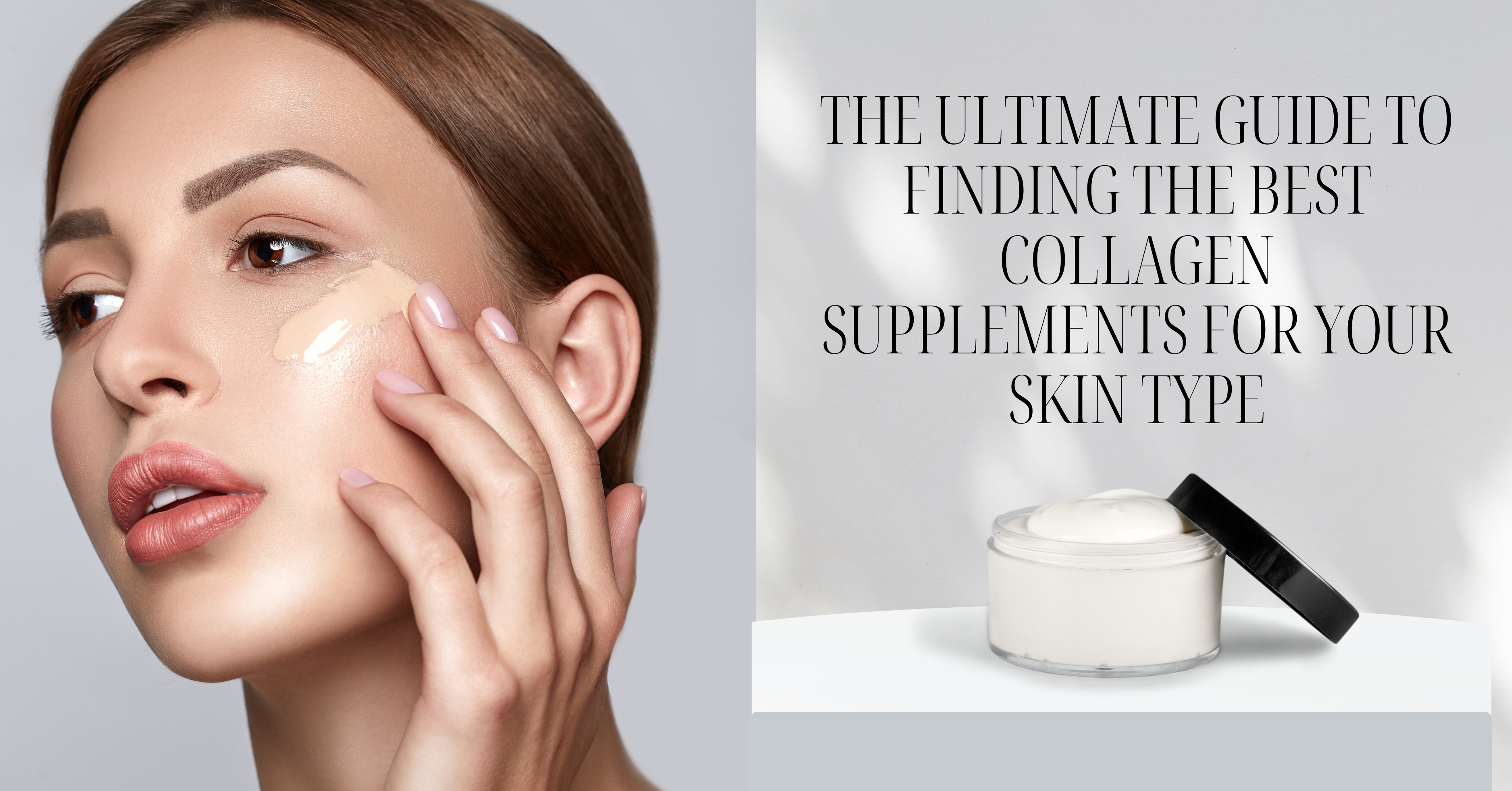
The Ultimate Guide to Finding the Best Collagen Supplements for Your Skin Type!
When I first started exploring collagen supplements, I was just like many of you—curious, hopeful, and a little overwhelmed by all the options. As a doctor, I knew the science behind collagen, but even I found myself wading through a sea of products, each promising miracles. After years of research and personal trial and error, I’ve found that not all collagen is created equal, especially when it comes to matching it with your skin type. So, if you’re wondering which collagen supplement is best for you, you’ve come to the right place.
What is Collagen, and Why Does It Matter?
Let’s start with the basics. Collagen is a protein that our body produces naturally. It’s like the glue that holds our skin, hair, nails, and even joints together. In fact, it makes up about 75% of our skin’s dry weight. But as we age, our body’s collagen production starts to decline—this usually starts in our mid-20s and accelerates in our 30s and 40s. That’s when you might start noticing fine lines, wrinkles, and less plumpness in your skin.
I remember hitting 30 and suddenly realizing my skin wasn’t as bouncy as it used to be. That’s when I started seriously looking into collagen supplements. But with so many products on the market, it was tough to know where to start. That’s why it’s crucial to understand how different types of collagen can impact your skin.
Types of Collagen Supplements: What You Need to Know
Hydrolyzed Collagen (Collagen Peptides)
This is the most common form of collagen supplement. The collagen protein is broken down into smaller peptides, making it easier for your body to absorb. Whether you have dry, oily, or combination skin, collagen peptides are a great place to start. They’re versatile and can be mixed into just about anything—smoothies, coffee, even water.
Marine Collagen
Marine collagen is derived from fish, and it’s known for being particularly beneficial for aging skin. I’ve recommended marine collagen to many patients over 40 who are looking to tackle fine lines and wrinkles. It’s more bioavailable than bovine collagen, meaning your body might absorb it more efficiently. However, it’s a bit pricier, and if you have a fish allergy, you’ll want to steer clear.
Bovine vs. Porcine Collagen
Bovine collagen comes from cows, while porcine collagen is derived from pigs. Both are rich in type I and type III collagen, which are great for skin health. Personally, I prefer bovine collagen because it’s more widely available and often comes in grass-fed varieties, which I find to be of higher quality. Porcine collagen, on the other hand, is often cheaper and can be a good option if you’re looking to save a bit of money.
Collagen Powders vs. Capsules
Here’s where personal preference comes into play. I like collagen powders because they’re versatile—you can mix them into anything. Capsules are convenient, especially if you’re always on the go, but they often require taking multiple pills to get the same dose you’d get in a scoop of powder. If you’re just starting out, try both and see what fits best into your routine.
Identifying Your Skin Type
Before you can find the best collagen supplement, you need to understand your skin type. Here’s a quick guide:
Dry Skin
If your skin feels tight, rough, or flaky, you likely have dry skin. Collagen is a great addition to your routine because it helps improve your skin’s hydration and elasticity. I always recommend choosing a supplement that also includes hyaluronic acid, which is a powerhouse for moisture.
Oily Skin
Oily skin produces excess sebum, leading to shine and sometimes acne. While collagen is less likely to affect oil production, you’ll want to choose a non-comedogenic supplement that won’t clog your pores. In my experience, powdered collagen is the way to go here, as it’s less likely to contain fillers that can aggravate your skin.
Combination Skin
Combination skin has areas that are both oily and dry, often with an oily T-zone (forehead, nose, and chin) and dry cheeks. It’s all about balance here. Look for a collagen supplement that’s lightweight and won’t over-hydrate your already oily areas while still providing enough moisture for the dry spots.
Sensitive Skin
Sensitive skin can react to just about anything, so you’ll need to be extra cautious. I recommend starting with a hydrolyzed collagen peptide that’s free from additives and allergens. Also, look for products labeled hypoallergenic.
Matching Collagen Supplements to Skin Types
Best Collagen Supplements for Dry Skin
For dry skin, you want a collagen supplement that not only boosts collagen levels but also locks in moisture. Look for products that combine collagen with hyaluronic acid or ceramides. These ingredients help keep your skin hydrated from the inside out. One product I personally love is Vital Proteins Collagen Peptides with added hyaluronic acid. It’s a bit on the pricier side, but it’s worth the investment for dry skin.
Best Collagen Supplements for Oily Skin
For oily skin, the key is to choose a supplement that supports your skin without adding excess oil or causing breakouts. A great option is Further Food Collagen Peptides—it’s pure collagen with no added sugars or fillers, making it less likely to clog your pores.
Best Collagen Supplements for Combination Skin
Combination skin can benefit from a balanced collagen supplement like Ancient Nutrition Multi Collagen Protein. It’s a blend of different types of collagen (including bovine and marine), which provides a broad spectrum of benefits for both dry and oily areas of your skin.
Best Collagen Supplements for Sensitive Skin
Sensitive skin requires gentle, hypoallergenic formulas. I’ve found that Great Lakes Gelatin Collagen Hydrolysate is an excellent choice. It’s unflavored, free from additives, and sourced from grass-fed cows, making it a safe bet for those with sensitive skin.
Additional Ingredients to Look For
While collagen is the star of the show, other ingredients can enhance its benefits:
Vitamin C
Vitamin C is essential for collagen synthesis. It not only helps your body produce more collagen but also protects your skin from free radical damage. If your diet isn’t providing enough vitamin C, consider a supplement like Garden of Life Mykind Organics Vitamin C Spray alongside your collagen intake.
Hyaluronic Acid
Hyaluronic acid is a moisture magnet, capable of holding up to 1,000 times its weight in water. I always recommend pairing collagen with hyaluronic acid, especially for those with dry or aging skin. Some collagen supplements, like NeoCell Super Collagen + C, already include this powerful ingredient.
Biotin
Biotin is known for supporting hair and nail health, but it also plays a role in maintaining your skin’s barrier function. Sports Research Collagen Peptides with added biotin is a great option if you’re looking to improve not just your skin but your hair and nails as well.
How to Incorporate Collagen Supplements into Your Skincare Routine
Dosage Recommendations
Most experts recommend 5-10 grams of collagen per day. This is the amount I’ve found to be most effective, both in clinical studies and in my own practice. Start with 5 grams daily and adjust based on how your skin responds.
Timing and Frequency
There’s some debate over the best time to take collagen, but I find it most convenient to mix it into my morning coffee or smoothie. This not only sets a routine but also ensures I don’t forget to take it. Consistency is key here—make collagen a part of your daily routine to see the best results.
Complementary Skincare Practices
Collagen works best when paired with a solid skincare routine. Make sure you’re also moisturizing daily, using sunscreen, and considering retinoids or peptides that stimulate collagen production from the outside.
What to Expect and When
Realistic Timeline for Results
Patience is essential when starting any new supplement. On average, you might start to see visible improvements in your skin’s texture and elasticity after 4-6 weeks of consistent collagen intake. For me, it took about two months before I noticed a real difference, so don’t get discouraged if results aren’t immediate.
Signs Your Collagen Supplement is Working
Keep an eye out for improved hydration, a reduction in fine lines, and a more plump, youthful appearance to your skin. These are all signs that your collagen supplement is doing its job.
Common Mistakes and How to Avoid Them
Overdosing on Collagen
More isn’t always better. Stick to the recommended dose—too much collagen can lead to digestive issues or, in rare cases, an imbalance in amino acids.
Ignoring Skin Type
This is a big one. Not all collagen supplements are created equal, and what works for someone with oily skin might not work for someone with dry skin. Always choose a supplement that aligns with your specific skin needs.
Lack of Consistency
Collagen isn’t a miracle cure—it’s a long-term investment in your skin’s health. Make sure you’re taking it daily, as missing doses can slow down your progress.
Conclusion
Finding the best collagen supplement for your skin type doesn’t have to be a daunting task. By understanding your skin’s unique needs and choosing a product that complements those needs, you can enhance your skin’s health and appearance over time. Remember, collagen is just one piece of the puzzle—pair it with a balanced diet, a good skincare routine, and a healthy lifestyle for the best results.
If you’re ready to start your collagen journey, consider the recommendations I’ve shared here, and always feel free
FAQ
The best collagen for skin is hydrolyzed collagen peptides, as they are easily absorbed and support hydration, elasticity, and overall skin health. Marine collagen is particularly beneficial for aging skin, offering enhanced bioavailability.
Collagen alone doesn’t whiten skin, but it can improve skin texture and hydration, making it appear more radiant. For skin whitening, look for collagen supplements with added ingredients like glutathione or vitamin C.
Collagen boosts skin elasticity, reduces wrinkles, strengthens joints, and supports bone health. It improves hair and nail strength, promotes gut health, and aids in muscle recovery. Essential for overall vitality and youthful appearance.
Collagen enhances hair strength, elasticity, and growth by supporting the hair follicle structure. It improves scalp health, reduces breakage, and can boost overall hair thickness and shine, contributing to healthier, more resilient hair.




